Civil Liberties, Civil Rights, Human Rights, Truth to Power
Podcast: Play in new window | Download


Dismantling Progress, Deportation And Sanctuary Cities
On Law and Disorder, we’re celebrating Black History Month. We remember and honor the ongoing struggle of Black Americans and their allies to achieve equality, justice and fairness. But the forces of white supremacy have opposed that struggle at every turn. Today, the President of the United States and his enablers are at the forefront of not only dismantling the progress that has been made but creating new obstacles to impede further progress.
On day one, Trump claimed to end birthright citizenship and he terminated Diversity, Equity and Inclusion policies and programs throughout the federal government and in companies with federal contracts. He has stepped up deportations and is sending undocumented immigrants to the infamous detention center in Guantanamo Bay, Cuba. He canceled flights for refugees already approved to travel to the United States. He has threatened to prosecute local officials in Sanctuary Cities who refuse to cooperate with ICE agents. He froze federal grants and loans designed to support low income food, housing, and educational programs. All told, in the first 18 days, he issued over 65 Execution Orders or policy statements that threaten to tear apart the fabric of American society that has been striving – haltering at times – to achieve Equality and Justice for All.
Meanwhile, the recent devastating fires in Los Angeles have destroyed entire communities in the wealthy Pacific Palisades and in less wealthy Altadena, which has a special place in the history of African Americans in Los Angeles. Will the ambitious plans to rebuild these destroyed areas favor the rich over the poor, as we saw after Katrina and so many natural and man-made disasters?
Guest – Sheila Miller serves as Director of Race, Equity & Inclusion at the National Immigration Law Center and leads the implementation of Diversity, Equity, Inclusion, Justice and Belonging (DEIBJ) initiatives. She is responsible for creating, training, managing, and optimizing all efforts to make the NILC internal workplace a fairer, more equitable environment for all employees. She partners with leaders across the organization to ensure progress toward NILCs vision of being a race-forward, fully inclusive organization.
—-

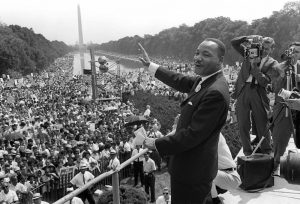
44 States Set to Remove Critical Race Theory
Forty four states have introduced bills or taken other steps that would restrict teaching critical race theory, or limit how teachers can discuss racism and sexism. Critical race theory is an academic and legal framework that recognizes systemic racism in the United States. It challenges the idea that racism is abnormal or that it’s just a result of individual bias.
In late January, the Department of Defense issued a memo removing the recognition of history months, such as Black History Month, Women’s History Month, and Pride Month, from its official observances, claiming such months played a divisive role in American society.
But we in the National Lawyers Guild still strongly believe such months can play a vital role in educating our diverse population on matters often given little or no attention in our lives or in our public schools around the nation.
So as far as we are concerned, this month, the month of February is still Black History Month. And, we’ve invited two guests who believe as we do to join us here on The Lawyers Guild Show today to discuss racism in America, both historic and present-day. That, in turn, means we will be examining critical race theory and consider why White America has so much fear of it being taught in our public schools.
Guests – Sharon Kyle and Dick Price, respectively publisher and editor of the LA Progressive, a daily on-line magazine widely read throughout the greater Los Angeles area, and beyond. Sharon Klye is Black, Dick Price, who happens to be her husband, is White.

———————————
Civil Liberties, Civil Rights, FBI Intrusion, Human Rights, Political Prisoner, Racist Police Violence, Right To Dissent, Surveillance, Torture, Truth to Power
Podcast: Play in new window | Download
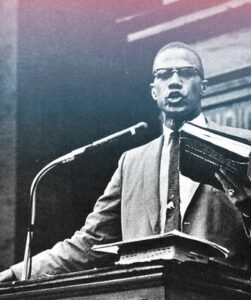
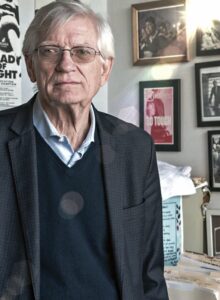
Malcolm X Shabazz et al. v. USA
A groundbreaking legal case seeks justice for the family of most iconic civil rights leaders, Malcolm X. In an unprecedented lawsuit filed by his daughters, the Shabazz family is challenging the U.S. government, the City of New York, and several high-ranking law enforcement agencies. At the heart of the case is the claim that state actors, including the FBI and NYPD, played an active role in the assassination of Malcolm X on February 22, 1965, and that this involvement has been systematically covered up for decades.
This suit, Malcolm X Shabazz et al. v. USA, not only seeks justice for the wrongful death of Malcolm X but aims to hold the government accountable for its complicity in the assassination. The case draws on newly uncovered evidence that links federal agencies to the events surrounding Malcolm X’s death, as well as the subsequent framing and wrongful conviction of two men who were exonerated in 2021.
The legal team behind this case includes civil rights attorneys Benjamin Crump and G. Flint Taylor, and if successful, their argument could rewrite the historical narrative surrounding one of America’s tragic and significant moments. At the core of this case is the question: How deep was the state’s involvement in silencing Malcolm X? Was the assassination part of a coordinated campaign by law enforcement agencies determined to prevent the rise of powerful Black leaders? The lawsuit raises profound questions about the government’s role in suppressing movements for racial justice and civil rights, both in the past and in the present.
Guest – Flint Taylor of the Peoples Law Office. Flint represented the family of Fred Hampton and revealed that the FBI and Chicago Police Department murdered him in 1969. Flint is an editor of the Police Misconduct Law Reporter and is author of The Torture Machine: Racism And Police Violence In Chicago.
—-
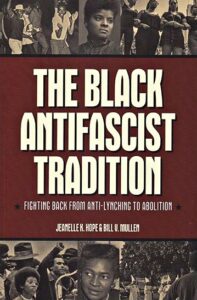
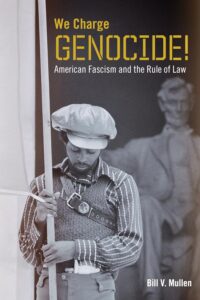
A History Of Anti-Black Racism
National chauvinism and racism are essential features of fascism. The practice of white racism in the United States during the Jim Crow era was something that Hitler’s party in Germany studied and emulated. This kind of anti-black racism went on in the United States from shortly after the Civil War up until the 1960s. It has never really gone away as the mass mobilizations of the Black Lives Matter movement has recently demonstrated. This Black resistance, this fight back, will be a central aspect of anti-fascist activity in the future.
Guest – Bill Mullen is professor emeritus of American studies at Purdue University and the co-founder of The Campus Anti-fascist Network. He’s also co-author of The Black Antifascist Tradition and his new book published last month We Charge Genocide: American Ashes and the Rule of Law.

——————————
Civil Rights, Human Rights, Supreme Court, Truth to Power
Podcast: Play in new window | Download

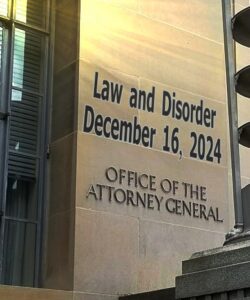
U.S. Attorney General Choice: Florida Attorney General Pam Bondi
Bondi, Florida’s first woman attorney general for eight years from 2011-2019, was part of Trump’s defense team during his first impeachment trial and supported his false claims of fraud following the 2020 election. She’s remained in Trump’s orbit since then, continuing to advise him on legal matters.
In announcing Bondi as his new choice, Trump signaled the role he expects her to play. “For too long, the partisan Department of Justice has been weaponized against me and other Republicans – Not anymore. … Pam will refocus the DOJ to its intended purpose of fighting Crime, and Making America Safe Again.”
By fighting crime, he means going after his political enemies. Bondi has loyally promised that “When Republicans take back the White House” and the Department of Justice, “the prosecutors will be prosecuted — the bad ones — the investigators will be investigated.”
Bondi is a partner at Ballard Partners, the lobbying firm that had been run by Trump’s incoming chief of staff Susie Wiles and whose founder, Brian Ballard, is a top Trump fundraiser. She is co-chair of the law and justice division at the pro-Trump America First Policy Institute. Thrust onto the national stage, Pam Bondi is not a household name. To learn more about her, we went to an award-winning journalist in her home state of Florida.
Guest – Scott Maxwell is a three-time-a-week columnist for the Orlando Sentinel. He joined the Sentinel newsroom as a reporter in 1998, and started writing his column in 2002. He has received awards from the Society of Professional Journalists, the Society of Newspaper Editors and others. Before coming to Orlando, Scott wrote for the Winston-Salem Journal and the Chapel Hill Herald, after graduating from the University of North Carolina at Chapel Hill’s School of Journalism.
—-
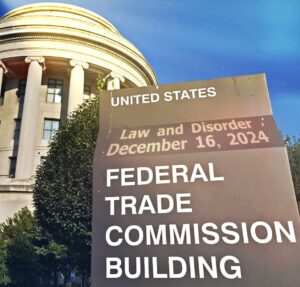
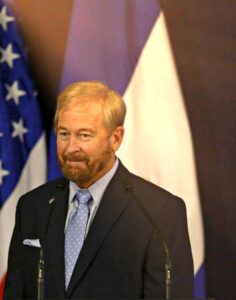
Next FTC Chairman: Business Friendly Approach Or Big Tech Anti-Trust Enforcement
President-elect Donald Trump last week named Andrew Ferguson as the next chair of the Federal Trade Commission. Ferguson is already one of the FTC’s five commissioners, currently consisting of 3 Democrats and 2 Republicans. Ferguson replaces FTC Chair Lina Khan, a vocal critic of Big Tech.
Antitrust laws are designed to promote fair competition by prohibiting monopolistic practices, unfair restraints on trade, and other behaviors that harm consumers or stifle innovation. The FTC plays a key role in enforcing these laws. It investigates businesses for anticompetitive practices, reviews mergers and acquisitions for potential harm to market competition and takes legal action to prevent or rectify violations.
With Trump’s recent nomination of Gail Slater as the Justice Department’s assistant attorney general for antitrust, some predicted that the incoming administration may continue Lina Khan’s tough stance on companies like Google and Apple. But many leading Republicans prefer a more business-friendly approach to antitrust enforcement that would avoid hampering Big Tech’s dealmaking and acquisitions.
Other top contenders for the FTC chairmanship were Melissa Holyoak, a Republican commissioner and former Utah solicitor general and Mark Meador, a former DOJ and FTC official who has served as an antitrust policy adviser to Sen. Mike Lee (R-Utah).
Guest – Laurel Kilgour from the American Economic Liberties Project in DC. Lauren leads the Project’s team of policy analysts and experts to produce research and policy briefs, with a focus on antitrust issues impacting economic liberties.

————————————–
Gaza, genocide, Human Rights, Targeting Muslims, Truth to Power, War Resister
Podcast: Play in new window | Download
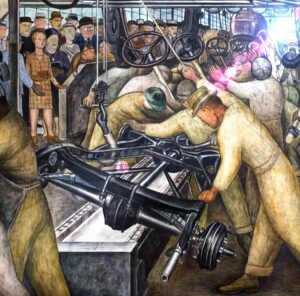
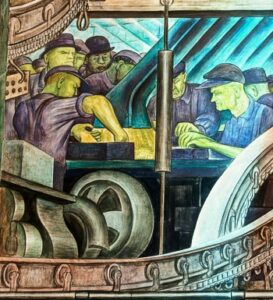
The Power Of Labor And A Workers’ Party
The forces of the gathering authoritarian storm in our country are evident in many ways. It is manifesting itself in powerful and continuing nationalism, in disdain for human rights, in the entwinement of government and religion, in a controlled mass media, in the protection of corporate power and the suppression of labor power and in the encouragement of violence.
The power of labor has been channeled into the Democratic and Republican Party, the twin parties of capitalism. We need a workers ‘ party, but we don’t even have the nucleus of one. Race and gender are formative in the building of authoritarian regimes. We see this in the United States. Haitians, who are Black, have been accused of eating cats and dogs. Women’s right to control their own bodies is under attack from the Supreme Court on down and women are marked as “childless cat ladies” and told to stay home and bear children.
Guest – Dianne Feeley is an editor of the magazine Against the Current. She is a leader of Solidarity, a socialist feminist organization. Dianne lives in Detroit where she has been an activist for many years in the United Automobile Workers union.
—-


Complicity In Genocide: CCR Case Against The Biden Administration Update
Last fall, the internationally acclaimed Center for Constitutional Rights in New York City filed a lawsuit in federal court on behalf of several Palestinian groups and individuals against President Joe Biden, Secretary of State Anthony Blinken, and Defense Secretary Lloyd Austin, alleging that Israel’s actions in Gaza have amounted to genocide and that Biden, Austin, and Blinken have failed their obligation under international law to prevent Israel from committing genocide in Gaza.
The lawsuit claimed that the 1948 International Convention Against Genocide requires the US and other countries to use their power and influence to stop the killing. and the lawsuit asked the court to bar the US from providing weapons, money, and support to Israel. At the time of the filing of that lawsuit here on Law and Disorder, we spoke with an attorney from CCR about the case. Since that time there have been a number of developments in the case.
Guest – Attorney Maria LaHood, the Deputy Legal Director of the Center for Constitutional Rights, or CCR, to join us to bring us up to date on where the lawsuit now stands. Much of Maria LaHood’s own work at CCR is on behalf of defending the constitutional rights of Palestinian advocates in the United States, such as in the case of Davis v. Cox. She was involved in defending the Olympia Food Co-op board members for deciding to boycott Israeli goods and the case of Awad v. Fordham, compelling the university to recognize Students for Justice in Palestine as a student club.

—————————-
CIA Sponsored Terror, Civil Rights, Human Rights, Prison Industry, Truth to Power, U.S. Militarism, Violations of U.S. and International Law, War Resister
Podcast: Play in new window | Download


What Kind Of Nation?
What kind of nation cuts off of food, water, medicine, electricity, and fuel to 2 1/3 million Palestinians and then bombs them as they sit trapped in the open air prison which is the Gaza Strip? What kind of national leader in his capacity as Israeli Minister of Defense, says “We are fighting human animals and we are acting accordingly.“ Israeli Prime Minister, Benjamin Netanyahu promised that “We will turn Gaza into a deserted island.”
What kind of a nation vetoes a cease-fire as the US did in a 13 to 1 vote when it was proposed at the United Nations Security Council? The Israeli and American nations finds themselves morally isolated on the world stage.
The American government supplies the weapons of war to a nation that has so far annihilated at least 20,000 people, including 8000 children. The Israelis use weapons made in the US and paid for by our tax dollars.
American foreign policy is driven by the military industrial complex. It’s a country whose weapons industry is closely allied with the weapons industry of Israel and a country whose government is heavily influenced by the Israeli lobby, a lobby that should be forced to register as an agent of a foreign country.
Guest – Aaron Maté about the continuing genocide in Gaza, which is now approaching 100 days. He is a journalist with The Gray Zone where he hosts “Pushback“. He is the co-host of Useful Idiots. In 2019 Aaron Maté won the Izzy award for outstanding achievement in independent media for his Russiagate coverage in The Nation.
—-
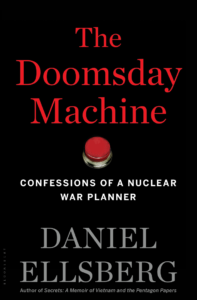

Unilateral Sanity Could Save The World: Nothing Can Be Changed Until Its Faced
As we begin 2024, the Bulletin of Atomic Scientists just reset its nuclear doomsday clock for the 24th time in its 76-year history. They created the doomsday clock just after WW2 to visually represent the threat of global nuclear annihilation. Although the precise time won’t be announced until later this month, the most recent change was just one year ago: in January 2023, when the clock was moved forward to 90 seconds til midnight – the closest to midnight ever.
What will 2024 bring? Will we get swept up in momentum and fervor toward global catastrophe? Or can we muster the will and courage to act … and try to save one another – other animals, the earth, and ourselves?
In his article, Unilateral Sanity Could Save the World, our guest: author and political analyst Norman Solomon, invokes Antonio Gramsci’s philosophy of keeping a “pessimism of the intellect,” but “an optimism of the will.”
Guest – Norman Solomon is a long-time associate of Fairness and Accuracy in Reporting, the national director of RootsAction.org, and the Executive Director of the Institute for Public Accuracy. His books include War Made Easy: How Presidents and Pundits Keep Spinning Us to Death; and his latest book, War Made Invisible: How American Hides the Human Toll of its Military Machine which was published by the New Press in June 2023.
Hosted by attorneys Michael Smith and Maria Hall

—————————–
Civil Liberties, Civil Rights, Criminalizing Dissent, Human Rights, Truth to Power
Podcast: Play in new window | Download
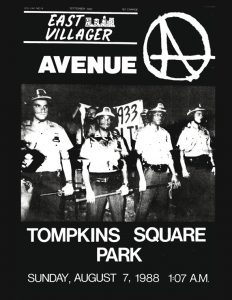
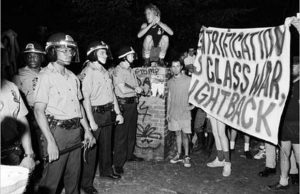
Tompkins Square Park Police Riot 35th Anniversary Special
Thirty five years ago, a singular event occurred in Manhattan’s East Village that would prove transformative to many lives for years to come. Today on Law and Disorder we bring you a special program on the August 1988 Tompkins Square Park Police Riot as recounted by several individuals who were there for the entire event. We share firsthand observations of unbridled police violence, talk about how we came to be there, and discuss how the riot marked the lynchpin to transform an entire neighborhood from a mecca of creativity and political activism, to the new home of TARGET, Starbucks and other hallmarks of American gentrification.
Tompkins Square Park is bounded on the West and East by Avenues A and B, and on the North and South by 10th Street and 7th Streets. It falls in the part of that neighborhood often referred to as Alphabet City, named for its 4 Alphabet numbered avenues, that in the 1960’s and 1970’s were a haven for drug sellers and squatters and a large Puerto Rican community. The park had a history of activism as it was the site of a riot in 1874 on behalf of the city’s labor movement.
In 1988, a homeless encampment was erected in the park, attracting a wide range of activists, squatters, and homeless persons. Several local residents complained and in a controversial move, the local governing body, Community Board 3, on June 28, approved a 1 AM curfew from what had long been a 24-hour open park. The Avenue A Block Association supported the curfew as it represented the few local businesses that existed then. Many residents opposed the curfew, including those who would have to take a longer walk around the park to get home.
The New York City City Parks Department agreed to enforce the curfew, and on July 31, 1998 protesters gathered at a rally there. Police, responding to alleged noise complaints, entered the park. A skirmish ensued, and several civilians and six officers were treated for injuries. Four men were arrested on charges of reckless endangerment and inciting to riot.
Guests – Susan Howard, East Village Community Activist, John McBride, Photographer and Arthur Nersesian, East Village Writer.
Written by Attorney Heidi Boghosian and produced by Geoff Brady.

———————————————-





















